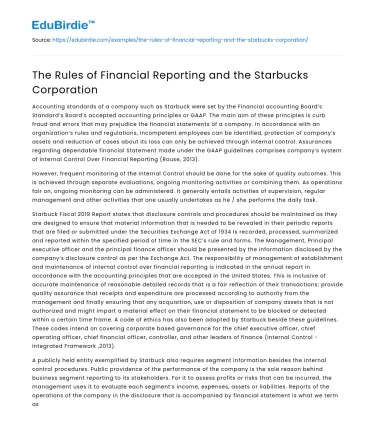Accounting standards of a company such as Starbuck were set by the Financial accounting Board’s Standard’s Board’s accepted accounting principles or GAAP. The main aim of these principles is curb fraud and errors that may prejudice the financial statements of a company. In accordance with an organization’s rules and regulations, incompetent employees can be identified, protection of company’s assets and reduction of cases about its loss can only be achieved through internal control. Assurances regarding dependable financial Statement made under the GAAP guidelines comprises company’s system of Internal Control Over Financial Reporting (Rouse, 2013).
However, frequent monitoring of the Internal Control should be done for the sake of quality outcomes. This is achieved through separate evaluations, ongoing monitoring activities or combining them. As operations fair on, ongoing monitoring can be administered. It generally entails activities of supervision, regular management and other activities that one usually undertakes as he / she performs the daily task.
Save your time!
We can take care of your essay
- Proper editing and formatting
- Free revision, title page, and bibliography
- Flexible prices and money-back guarantee
Starbuck Fiscal 2019 Report states that disclosure controls and procedures should be maintained as they are designed to ensure that material information that is needed to be revealed in their periodic reports that are filed or submitted under the Securities Exchange Act of 1934 is recorded, processed, summarized and reported within the specified period of time in the SEC’s rule and forms. The Management, Principal executive officer and the principal finance officer should be presented by the information disclosed by the company’s disclosure control as per the Exchange Act. The responsibility of management of establishment and maintenance of internal control over financial reporting is indicated in the annual report in accordance with the accounting principles that are accepted in the United States. This is inclusive of accurate maintenance of reasonable detailed records that is a fair reflection of their transactions; provide quality assurance that receipts and expenditure are processed according to authority from the management and finally ensuring that any acquisition, use or disposition of company assets that is not authorized and might impart a material effect on their financial statement to be blocked or detected within a certain time frame. A code of ethics has also been adopted by Starbuck beside these guidelines. These codes intend on covering corporate based governance for the chief executive officer, chief operating officer, chief financial officer, controller, and other leaders of finance (Internal Control - Integrated Framework ,2013).
A publicly held entity exemplified by Starbuck also requires segment information besides the internal control procedures. Public providence of the performance of the company is the sole reason behind business segment reporting to its stakeholders. For it to assess profits or risks that can be incurred, the management uses it to evaluate each segment’s income, expenses, assets or liabilities. Reports of the operations of the company in the disclosure that is accompanied by financial statement is what we term as Segment reporting. An operating segment engages in business activities from which it may earn revenue and incur expenses. It has discrete financial information which is available and regular viewing of the results by the entity’s chief operating decision maker of performance and allocation of resource decisions. This is as per the GAAP
Starbuck’s Fiscal Report of 2019 states that Americas (U.S., Canada, and Latin America), China/Asia Pacific, EMEA (Europe, Middle East, and Africa), and a Channel Development segment (including roasted whole bean and ground coffees, premium Tazo teas, Starbucks and Tazo-branded single-serve products, a variety of ready-to-drink beverages, such as Frappuccino, Starbucks Double shot and Starbucks Refreshers beverages) are the three segments that are considered reportable. The results of operation by segments from segment information in the annual fiscal report include; net revenues (company-operated stores, licensed stores, and foodservice and other), operating expenses (cost of sales including occupancy costs, store operating expenses, other operating expenses, depreciation and amortization expenses, and general and administrative expenses), and operating income (including income from equity investees where applicable) (Starbucks Fiscal Report , 2019).
The price one will receive to sell an asset or pay to transfer a liability between participants is what is referred to as Fair Values as per the Starbucks. It determines fair values based on 3 level inputs. The first will put into use prices that have been quoted for similar assets to determine value in active markets. The second level will be applicable when the prices are not available and will be based on the factors such as quoted marked price of assets that are similar or cash flows on discount models using market data that are available readily.
Finally, an organization also requires reporting of leases. A lease is an arrangement where the lessor agrees to allow the lessee to use an asset for a stated period of time in exchange for one or more payments as per the international Financial reporting standards. Classification of payment as rental expenses is something that must be done by a company that leases an asset under the operating leasing arrangement. The company records credit to the cash account and debit to the lease payment account Once the periodic lease obligation is paid. For instance, Starbuck is under operating lease. This is because most of Starbucks’ “lease agreements contain tenant improvement allowances, rent holidays, lease premiums, rent escalation clauses and/or contingent rent provisions. It leases retail stores, roasting, distribution and warehouse facilities and office space for corporate administrative purposes under operating leases (Corcoran, 1968).
References
- Corcoran, E. T. (1968). Reporting of Leases. Financial Analysts Journal, 24(1), 29-35.
- Rouse, M. (2013). GAAP (generally accepted accounting principles). Retrieved February 4, 2020, from https://whatis.techtarget.com/definition/GAAP-generally-accepted-accounting-principles
- Starbucks Fiscal Report . (2019, October 30). Starbucks Reports Q4 and Full Year Fiscal 2019 Results. Retrieved from https://stories.starbucks.com/press/2019/starbucks-reports-q4-and-full-year-fiscal-2019-results/






 Stuck on your essay?
Stuck on your essay?

